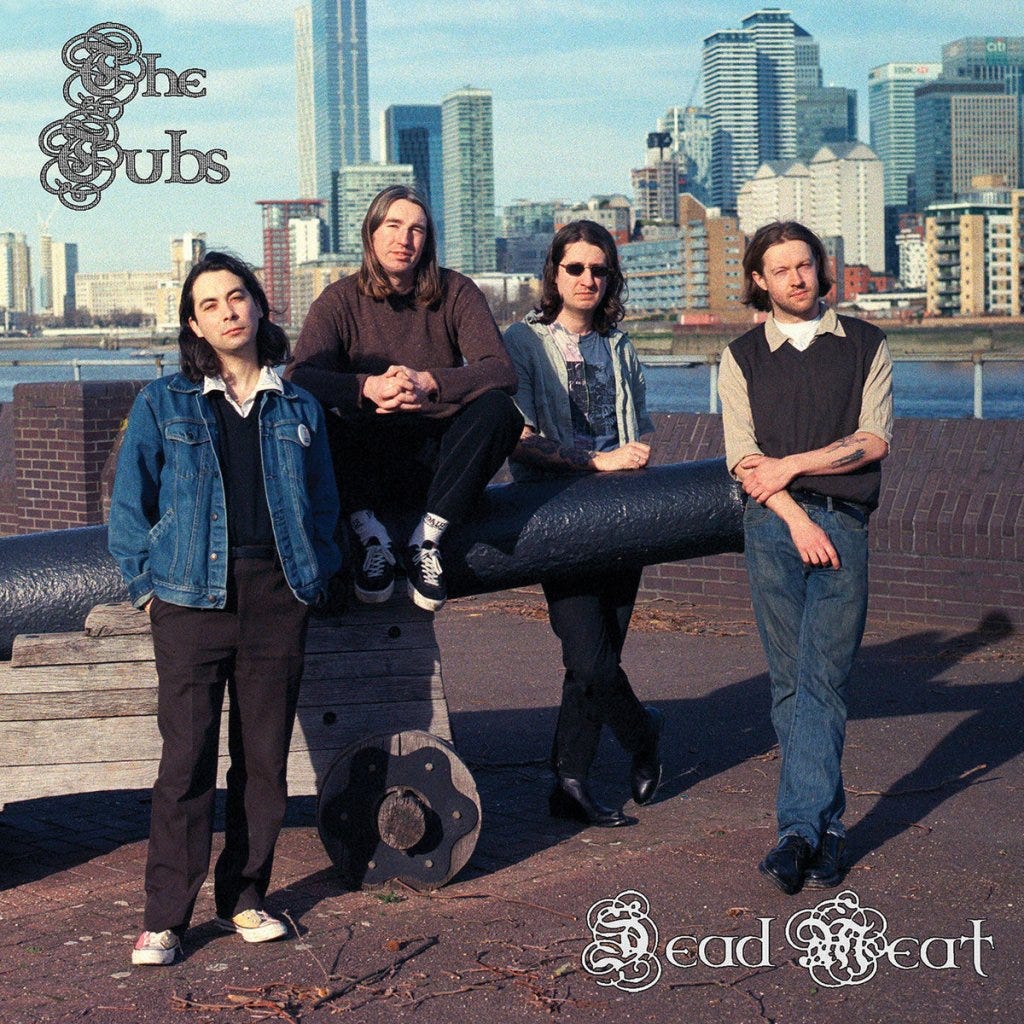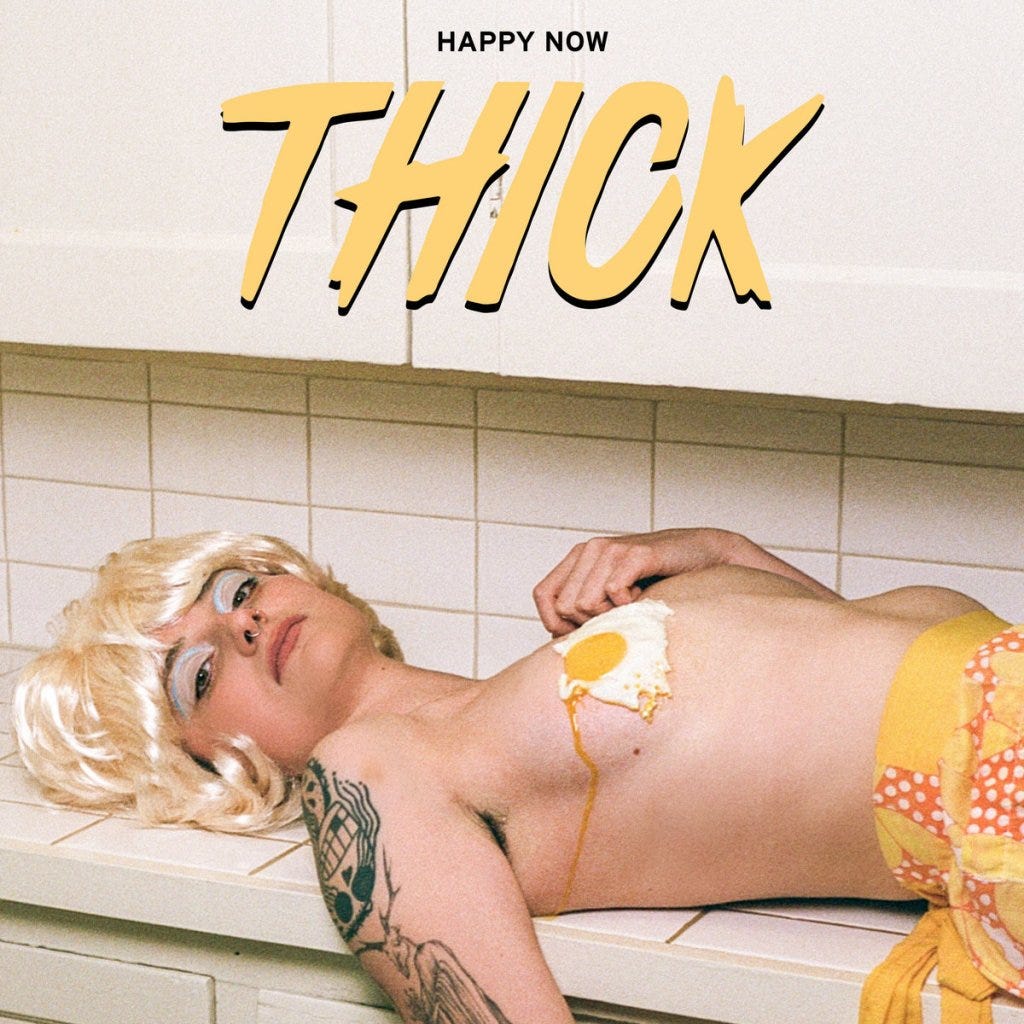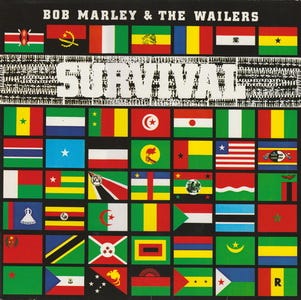THE TUBS, THICK, AND BOB MARLEY'S SURVIVAL
Having gotten the crankiness out of their system (well, for the most part), the 6OGs return to albums they love: Brian nominates an early favorite for 2023 album of the year (while taking a few drinks), Brad goes back to one of his 2022 favorites to find a band that moved out of the in between when playing live, and Charles pays homage to Bob Marley's most political record (but throws in some rock/reggae fails, just to keep the crankiness present).
New album: Dead Meat by The Tubs. Much like 2022’s Easy Listening by power pop band 2nd Grade, this album is right in my wheelhouse. But instead of full-on power pop, this debut album from Welsh band The Tubs is influenced by, and embraces, ‘80s college rock, right down to the jangly guitars. (Here’s a challenge: read all the coverage of this album and take a drink whenever a variation of the word “jangle” is used; try not to pass out.)
The Tubs are led by Owen Williams, former guitarist of the noise-pop band Joanna Gruesome, which broke up in 2017. Williams now also takes on the roles of singer and primary songwriter, and he excels at both. His voice has a heart-on-sleeve tone that matches both the lyrics and the jangly guitars (drink), yet is occasionally interrupted by a punk-influenced growl that carried over from his previous band.
We could look back on Dead Meat in 10 years and remember it as a footnote of an album that briefly introduced a generation to classic ‘80s jangle pop bands (drink). But I prefer to think of The Tubs as a band just getting started, and I look forward to seeing where they take jangle pop (drink) in the future. Personally, I hope that, while they are touring, The Tubs are listening to a ton of Camper Van Beethoven and Guadalcanal Diary.
Brian
The college rock influences are apparent on each track. Album closer “Wretched Lie” plays like an homage to The Smiths, featuring Morrissey-like vocals and Johnny Marr guitar chords. The title track and “I Don’t Know How it Works” evoke early solo Bob Mould, while “Sniveller” is reminiscent of Pylon while retaining a bit of Joanna Gruesome’s noise-pop, albeit slightly sanded down. The album opener, “Illusion pt II,” sounds like Crazy Rhythms-era Feelies, while the next song, “Two Person Love,” is more in line with Good Earth-era Feelies. “That’s Fine” and “Round the Bend” both bring to mind Murmur-era R.E.M., while “Duped” sounds more influenced by Fables of the Reconstruction.
It’s tempting to look at this album as a nostalgia exercise, similar to when Interpol’s Turn on the Bright Lights caused the kids to seek out Joy Division’s catalog. We could look back on Dead Meat in 10 years and remember it as a footnote of an album that briefly introduced a generation to classic ‘80s jangle pop bands (drink). But I prefer to think of The Tubs as a band just getting started, and I look forward to seeing where they take jangle pop (drink) in the future. Personally, I hope that, while they are touring, The Tubs are listening to a ton of Camper Van Beethoven and Guadalcanal Diary.
It may only be March, but Dead Meat is an early contender for one of my favorites of 2023. (Brian)
Album from an upcoming/recent live show: Happy Now by THICK. Bands that sit in between genres and emotions can be stuck when they play live, as it's hard to move seamlessly during a set. Still, my experience is that most try that approach because, I suppose, it's just what they do, and they don't put quite enough into live show prep to find a new direction. Going song to song, back and forth, staying true to their catalog but never quite finding the live groove and leaving the audience stuck and often wishing they were just listening to the records at home.
THICK broke that mold during their live set -- and went all-in on the punk aggression, with the songs rocking just that much more. Take a track like "Her Chapstick," with lyrics that define the band's writing: "I fell asleep alone again in our big bed last night/Even though you were right there" and "I try to hide my feelings/I thought I could bury them beneath the ground/I know that I can forgive you/I don't know when." On the album, the song lopes along at more of a mid-tempo pace, with the interplay of the trio's vocals the most dominant feature. But live, while those vocals remained prominent, they were overtaken by a shrill, even shredding, guitar, and drums moving that much faster. It imbued the song with a level of anger that worked and overcame the in-between.
"Disappear," a beautiful and desperate tune in which they try desperately to reach a friend or lover consumed by inner demons ("You disappear when I'm right here/Taken by voices that I can't hear/I wish I could take all of your pain/Bottle it up and I'll throw it away"), also moved from a mid-tempo plea, where the vocals exude fear in the face of the trauma the song's subject is experiencing, to a level where you feel more certain that eventually she'll find her way through to the lost soul.
The tracks that already rip harder, especially "Loser," "Happiness," and "Your Garden," came together even more live, perhaps because these are the songs that already have a clearer point of view and are less in-between. Take "Your Garden," with the chorus that gives the album its title: "I hope you got what you deserved/I hope you're not lying to her/Glad that I got out/I'm so happy now." On the record, the force of the emotion, energy, and the victory over this abusive a-hole is clear; at the show, it was anthemic and cathartic, and the crowd rode the wave.
Signed to legendary punk label Epitaph Records, THICK are not necessarily breaking new ground in the genre(s) they work in, but their space in between is rewarding and energizing. On their records, it's those mid-tempo songs that hit the sweet spot for their sound ("Montreal," which they didn't play at the show, is perhaps the real standout on this one, along with "Her Chapstick" and "Disappear"), but live, I was, well, happy now that they moved out of the in between and went all in. (Brad)
Album bring rediscovered (at least 10 years old): Survival by Bob Marley. In junior high, my parents discovered they could vacation in places other than the Michigan woods--like Jamaica. After one trip, Bob Marley’s Survival on vinyl appeared in our record collection. It was my first exposure to reggae (other than the warmed-over classic rock bastardizations (see below for my list of worst reggae songs by rock artists)), and it planted a seed.
My parents took my brother and me on one trip, and we soon learned music, especially Marley’s music, saturated the island. Every hotel had a reggae band in the lobby, every tour guide pointed out places connected to Marley, no matter how tenuous. We brought home a home-recorded steel drums on cassette sold to us by the hotel band with a hidden surprise: after about 10 minutes of dulcet steel drum music, the cassette abruptly cut to Wayne Smith’s “Under me Sleng Teng,” and a passion was ignited.
I dug deeper into the genre, moving past the ubiquitous "Legend" and digging as deep into the genre as the bins of the Camelot Music in my suburban mall could take me. I branched out to other artists, like Jimmy Cliff and Third World, and stumbled upon the grail of the Harder They Come Soundtrack. I even sported a Peter Tosh “Legalize It” t-shirt for a time (I’m not sure if my parents were aware.)
The album remains a favorite, and I’ll even argue it’s Marley’s best album. After "Kaya," with a smiling Marley on the cover and vibey songs like “Easy Skanking” and “Is this Love,” "Survival" is an unstintingly political album. Survival announces its intentions with a cover made up of African flags and a schematic of a slave ship and an opening track titled, “So Much Trouble in the World.”
The best albums open your mind to new ideas—musical and other. This album gave me my first glimpse of African social and political issues, like the liberation of Zimbabwe from colonial chains and the African Unity movements. Maybe it was weird for me to draw a map of Africa with “Africa Unite” written above it on my algebra notebook, but it was also transformative to be exposed to this other world by way of a suburban Camelot Music.
Charles
While politics were always present on Marley’s other albums, Survival contains no “One Love” or “Three Birds” to lighten the mood. The album’s politics are interlaced pathos, and the songs are serious and dark. “Zimbabwe” is the standout with its vow that “we gon’ to fight, fighting for our rights.” Frankly, the album is a bit of bummer, and I can’t listen to without expecting to be a little bit down at the end. That none of the songs from "Survival" appear on "Legend" is no surprise.
The best albums open your mind to new ideas—musical and other. This album gave me my first glimpse of African social and political issues, like the liberation of Zimbabwe from colonial chains and the African Unity movements. Maybe it was weird for me to draw a map of Africa with “Africa Unite” written above it on my algebra notebook, but it was also transformative to be exposed to this other world by way of a suburban Camelot Music.
Worst reggae songs by rock bands:
5. Led Zeppelin – “D’yer Mak’er.” I kind of like this song in sixth grade, but, yeah, it seems pretty awful now.
4. Every Sublime song.
Actually, let’s just stop. This whole list is just making me mad the more I think about it. I’ll add just one more--
1. Eric Clapton – “I Shot the Sheriff.” That this dreadful cover was more successful than the original chokes me with rage. (Charles)





